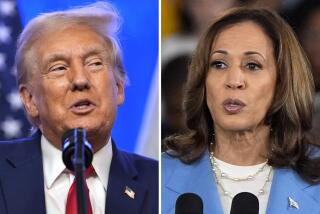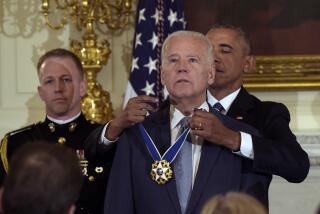Getting ready for the White House
WASHINGTON — Even as they plot their paths to victory, Barack Obama and John McCain are thinking past election day, enlisting advisors to quietly vet potential Cabinet secretaries, devise a governing strategy and assemble the rudiments of a new White House.
Preparing for the presidency is something the two campaigns are loath to talk about. Neither wants to appear presumptuous to voters who won’t pick a winner for two weeks. But with the economy teetering and the nation at war, both sides are planning for a transition that students of the presidency say is the most consequential since 1861, on the eve of the Civil War.
“I don’t mean to be hysterical, but this is the toughest transition faced by any president since [Abraham] Lincoln,” said Paul Light, a professor at New York University’s Wagner School of Public Service. “There is very little wiggle room. There’s the fiscal crisis, we are in a couple of wars and there is international tension.”
Of the two candidates, Obama’s preparations to take over Jan. 20 are further along. People close to him say that a kind of Democratic government-in-exile is laying detailed plans to smoothly take control should he prevail.
McCain aides, echoing the candidate’s criticism that Obama is already “measuring the drapes” in the Oval Office, said Obama’s transition work is a sign of overconfidence. Rick Davis, McCain’s campaign manager, said the Illinois senator was making a “public splash” by planning for a future administration.
“It’s not in the nature of John McCain to tempt fate,” he said.
The Arizona senator’s effort is headed by John F. Lehman Jr., a Navy secretary under President Reagan. William Timmons Sr., a prominent Washington lobbyist who helped plan Reagan’s and President Bush’s transitions, sent material about the mechanics of presidential transitions to the McCain campaign a month ago.
In an odd political twist, the Obama operation is dominated by alumni of the Clinton political machine, some of whom worked for Hillary Rodham Clinton during the Democratic primaries.
John Podesta, a chief of staff under President Clinton, has spent much of the election year helping 50 experienced Washington hands -- including a couple of Republicans -- compile a comprehensive transition blueprint, one that most thought would be used by Hillary Clinton.
An early outline showed it to have 50 chapters, written for the most part by Clinton veterans, with planning down to the sub-Cabinet level. Now that project, soon to be published as a book, would help guide an Obama transition if he were to win.
Podesta, who declined to discuss the transition, is based at the Center for American Progress, a left-of-center Washington think tank set up by Clinton allies that has emerged as the unofficial headquarters of Obama’s transition planning. With no designated transition office, Podesta is coordinating much of the work from the center, trying to keep his two jobs separate.
Podesta has set up teams aligned with Cabinet agencies and government departments. Leon E. Panetta, another former Clinton chief of staff and a onetime California congressman, is part of a group evaluating candidates for senior White House staff and high-level national security and economic policy positions.
“They’re collecting names of people and resumes,” said Rep. Rahm Emanuel (D-Ill.), an Obama supporter who also worked in the Clinton White House.
Prominent aides to Clinton, such as former Treasury Secretary Robert E. Rubin and former White House economic advisor Gene Sperling, are helping shape the economic ideas that would inform an Obama administration, a mission that is all the more urgent with financial markets in turmoil.
“Definitely, the next president will have to face it immediately,” said Jason Furman, a top economic advisor to Obama who noted that he would want swift passage of a plan aimed at the middle class. Last week, Obama called for tax credits for businesses that created jobs and a 90-day moratorium on home foreclosures.
On environmental matters, the Obama team is getting advice from Carol Browner, who headed the Environmental Protection Agency in the Clinton era.
Those close to Podesta say there are intentional parallels between a possible Obama transition and one widely heralded as a model: the carefully calibrated transfer of power that took place in 1980 when staff members working for Reagan collaborated with a relatively new Washington think tank, the Heritage Foundation.
One expert at the Center for American Progress advising Obama, defense analyst Lawrence Korb, played roles in the Reagan transition and the Reagan Defense Department. In 1980, Korb wrote a chapter on defense policy for the transition book prepared by the Heritage Foundation. Now, Korb is writing a chapter on Iraq for the Center for American Progress’ book.
No decisions seem to have been made about who would staff the highest levels of an Obama administration. But names are floating about. Tom Daschle, the former Senate Democratic leader, has been mentioned as a possible chief of staff. Daschle is a senior fellow at the same think tank that is home to Podesta.
In an interview last week, Daschle did not rule out an appointment as chief of staff. “It’s way too early to make any comments about it,” he said. “It’s always a possibility, but I’ve not had any conversations with anybody about future positions and don’t intend to.”
A possible holdover from the Bush administration is Defense Secretary Robert M. Gates. Senior national security advisors to Obama and McCain have acknowledged both are considering asking Gates to stay on to provide continuity in a time of war.
Gates has repeatedly said he intends to retire to his home near Seattle when Bush’s term ends. Asked Friday at a Pentagon news conference if his thinking had changed, Gates said: “Well, let me just say that I’m getting a lot more career advice and counseling than I might have anticipated. I think I’ll leave it at that.”
Obama and McCain have asked the Bush administration to quickly grant security clearances to people who would play key roles in a transition. Bush signed an executive order this month creating a special council empowered to arrange briefing material for political appointees.
With the Sept. 11 terrorist attacks a vivid memory, the White House wants to give its successor the tools to cope with a national security crisis should one arise early on, experts said.
“In this transition, the government has been doing more than it has in the past to start early,” said Martha Joynt Kumar, a political science professor at Towson University and an expert on presidential transitions. “That’s a result of 9/11.”
Already, infighting has broken out among people working on Obama’s transition. One sticking point involves nonprofit advocates anxious to ensure allies are chosen for offices that award grants.
“People have transition fever now in the Obama camp,” Light said. “It looks already like the classic transition fights over who gets which position. Sometimes these disputes can become debilitating.”
--
tom.hamburger@latimes.com
Times staff writer Peter Spiegel contributed to this report.
More to Read
Get the L.A. Times Politics newsletter
Deeply reported insights into legislation, politics and policy from Sacramento, Washington and beyond. In your inbox three times per week.
You may occasionally receive promotional content from the Los Angeles Times.










